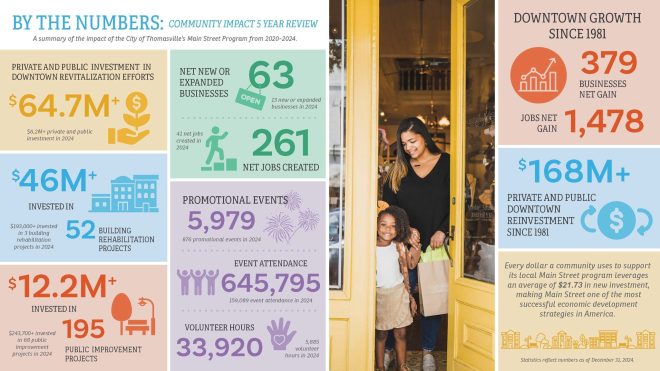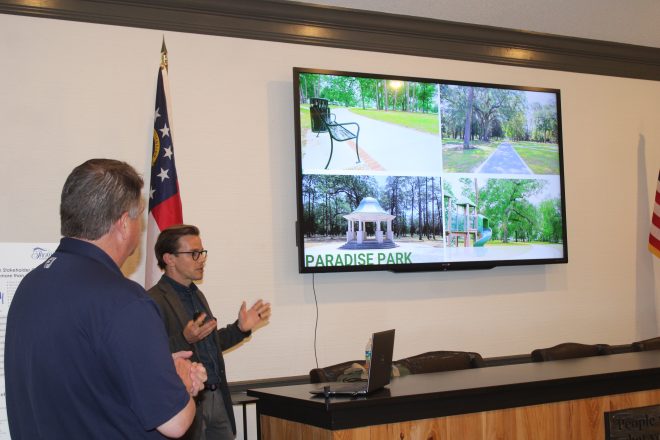Chambliss’ fireside chat
Published 1:00 pm Sunday, April 21, 2019

- Thomas Lynn | The Valdosta Daily Times
VALDOSTA — Former U.S. Sen. Saxby Chambliss stopped by Valdosta/Lowndes County for the 2019 Legislative Luncheon earlier this month for a fireside chat.
The former senator from Moultrie answered a number of questions at the lunch hosted by the Valdosta-Lowndes County Chamber of Commerce at the James H. Rainwater Conference Center.
Trending
During the lunch, Chambliss sat down with John Page, chamber government affairs council chairman, Donna Slaughter, Valdosta Board of Realtors, and Bill Slaughter, Lowndes County Commission chairman.
Chambliss served in the U.S. House of Representatives from 1995-2003 and in the U.S. Senate from 2003-15.
Chambliss answered a number of legislative questions on topics such as cyber security, immigration, bipartisanship and health care.
Here are excerpts of that conversation.
Where do you see cyber security today?
Chambliss: “In the 2005-06 time frame, we had this director of national intelligence, a gentleman who would constantly bring this up in our classified briefings. People would say, ‘cyber security? I never heard of that.’ Their eyes would glaze over. Nobody had ever heard of it. They had no concept of it.
Trending
“Well, it wasn’t long after that where we saw the public breaches at Home Depot, Neiman Marcus and other places, and all of a sudden, people all over the world started realizing this is a big deal.
“There are … groups of folks who are the bad actors in the world of cyber security. You have nation states, primarily Russians, Chinese, Iranians and North Koreans. They are all getting more and more sophisticated, and today they are all very, very good at what they do – not good for us.
“Then you have common criminals. I was on a panel in Houston a few weeks ago with a special agent in charge with the FBI who said he was working on a case at that point in time with respect to a motorcycle gang that had gone from raising money by kidnapping people and holding them for ransom to engaging in actions involving what we call ransomware.
“What that means is that cyber-security criminals, these bad actors, will find vulnerabilities in systems in the business community – it may be small business; it may be a hospital; it could be a big business; it doesn’t matter.
“But on Friday afternoon, all of sudden, as you’re getting ready to make your payroll, they will send you a message and say, ‘We have encroached in your system and are shutting it down. If you want your system opened up again, you will send $50,000 or $100,000 in Bitcoin to this address.’
“It happens time and time again, and time and time again, people are paying them.
“Everybody is vulnerable. You’re all walking around today with an iPhone or a Samsung or whatever it may be. You have no idea how much information Apple or Samsung or these other providers have about you that even the federal government … does not know about you. That information is valuable to a lot of people, and it is sold to a lot of people.”
Based on the current political climate surrounding immigration, how do you see this affecting the agricultural and construction industry as well as the overall effect on our labor force?
Chambliss: “There is no question that our immigration system in this country is broken, and it needs a vast overhaul.
“We tried on any number of occasions during my 20 years in Washington to make those changes through a comprehensive bill, and I will tell you that there is not a more emotional issue in America than the issue of immigration.
“My office in the Senate, since we represented right at 10 million people, my average communications coming into my office would be around 5,000 per day. That’s a big number for anybody’s office. During the immigration debate, not only did they shut down the phone systems in the Capitol, but we were getting 20,000 calls and emails a day on the issue of immigration.
“It is a very emotional issue. From the standpoint of trying to deal with it in a comprehensive way is just not possible right now, because Washington has such a toxic atmosphere. A place where (Congress) can do some very positive things is in the area of our agriculture programs.
“We have a program called H2A, which is a Visa program that farmers can take advantage of. My son-in-law is a produce farmer in Moultrie.
“Joe has used H2A from day one, and he gets any number of migrants twice a year under this program. He has to pay for them; it’s very expensive. He has to pay for them to come to Moultrie. He has to house them and has to make sure they are paid a wage that turns out to be a good bit more than minimum wage.
“But he has the assurance that those workers are going to be there and that they are going to be able to do the job he needs done, and then he has the assurance, as well as the government has the assurance, that at the end of that time they’re going to go back to where they came from.
“We have sought to make some changes to that program, to make it a little less expensive because that way more farmers would use it. We came up with ways to make the red tape they have to go through a little less bureaucratic.
“Unfortunately, as with any other immigration issue, as soon as you mention that you are going to be dealing with a piece of legislation regarding immigration, the far-right starts screaming and hollering ‘amnesty.’ Even though it has nothing to do with amnesty. The far-left … are opposed to foreign workers coming in – period.
“So, you have a lot of emotion coming from both sides, and that’s why it’s been so very, very hard to get anything done relative to an immigration reform package, but the agriculture sector is ripe for doing it.
“What we got works, but we need every farmer having it made available to them, irrespective of whether they need 10 workers or whether you need 1,000 workers, and right now it doesn’t work for the smaller farmers.”
How do you see bipartisan cooperation on capital hill today?
Chambliss: “The biggest problem we have with respect to the bipartisan action – that we used to see on a regular basis – is that compromise has become a four-letter word.
“We have more members of the House, as well as members of the Senate, on the far-right and you have more on the far-left. Their position is their position, and it is the only right position, meaning that’s the only thing they’ll accept. Well, that just doesn’t work.
“When I was in office … I was sworn into office on a Tuesday. Since the Republicans were in the majority, whatever committee I was on I was immediately going to be a sub-committee chairman, because that’s the way the numbers always fall.
“I got to choose the immigration sub-committee. It was the committee I wanted to chair, because I wanted to work on the H2A problem, primarily. Well, my ranking member on that committee was Ted Kennedy, and I didn’t know Ted. … But the day after I was sworn in on that Tuesday, I’m sitting on the floor, and Ted starts walking over to me.
“As a freshman member of the Senate – I’d been there two days and here’s this guy who’s been there 30 years and an icon and knowing that, philosophically, that we were 180 degrees apart – I wasn’t sure what he was coming to talk to me about.
“He came straight up to me. He introduced himself, and he said, ‘Saxby, you’re going to chair the sub-committee. I’m your ranking member, and you and I need to sit down and talk about what your priorities are and I’ll tell you what mine are and let’s see what we can work on to get accomplished during the two-year period.’
“I said, ‘Great, Ted, I’ll get my scheduler to call yours today, and I’ll find a time to come to your office and sit down with you.’ He said, ‘No. That’s not the way the Senate works. You’re the chairman. I’m the ranking member. I’ll have my scheduler call your scheduler.’
“He came to my office the next afternoon, and we spent two hours together, and we developed a relationship that turned into a friendship. And Ted Kennedy was the best legislator I’ve ever seen. He knew what compromise was all about, and he wanted you to feel good about what you were getting … and at the same time, he expected you to give him something.
“That’s the way compromise works.”
Do you feel like there will be revisiting of the Affordable Care Act and will health-care legislation take place in the next couple of years?
Chambliss: “I do. I think there are parts of the Affordable Care Act that, frankly, are pretty good, and we never questioned that and questioning the overall act about some parts of it being very meritorious.
“But there are some parts that don’t work well. Some parts are forced upon the business community when the business community can’t afford those mandates. The real unfortunate part about what’s happened over the last two years is that Republicans complained for 12 years about the Affordable Care Act, or Obamacare, but Republicans never came up with an alternative plan.
“Shame on us for not doing that.
“Lindsey Graham (Republican senator from South Carolina) told me one time – he was involved in national security and foreign policy and not in health care – but he came up with a plan, finally, out of frustration. And he said, ‘When Lindsey Graham has to come up with a health-care plan that tells you how much trouble Republicans are having developing a plan.’
“But he’s right in that respect.
“We never have come up with a plan to replace it, and there’s going to be some nibbling around the edge. I don’t know that there is going to be a major overhaul of it, but there needs to be some tweaking, so doctors feel comfortable with it, and patients are getting the choices that they want and need with respect to the delivery of health care.”
Thomas Lynn is a government and education reporter for The Valdosta Daily Times. He can be reached at (229)244-3400 ext. 1256





